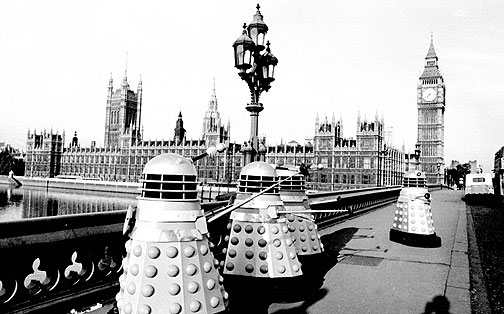No time like the present...
THE DALEK INVASION OF EARTH is a landmark story for two main reasons. The most obvious selling point was the first return of the Daleks following an unexpected bout of Dalekmania.
The other milestone is the first departure of one of the regular cast.
Terry Nation weaves together a fairly loose story to connect the two, involving a version of Earth's future history in the wake of a Dalek invasion.
The Daleks themselves are more mobile than before, coming equipped with handy satellite dishes so they can move (somewhat) freely without the aid of metal floors or static electricity. They are in their element here, with images provided by their jaunts over several major London landmarks being justifiably iconic.
We also discover the existence of a black Dalek Supreme, who seems to oversee the concentration camp and the upkeep of the Slyther, some kind of mutant guard dog hybrid of Marty The Monster and a mushroom.
We are shown a grim, dystopian world under Dalek control, with most humans relegated to an existance as Robomen, slaves, starving outcasts or splintered rebel groups. The first real foray into a recognisable human future is a grim experience, not least for Ian and Barbara, who are separated early and given their own companions in their attempts to fight back against oppression.
Barbara tems up with Jenny (played with a nice sideline of cynicism by Ann Davies, the wife of the late Richard Briers) and Dortman, until the demise of the latter provides the impetus for the women to carry on the fight. The episode where Barbara and Jenny push Dortman's wheelchair across London is a visual tour-de-force, showcasing beautifully the series first real location shooting.
Susan, meanwhile, is teamed up with David Campbell, a young resistance fighter who might as well have LOVE INTEREST stuck to him in neon lights. Susan is given a rare chance to develop as a character, and is no longer the naive schoolchild or helpless grandaughter.
The Doctor is also in his element here, easily taking control and confronting the Daleks no matter what odds are stacked against him. When he finally suceeds and gives a nod to the strength of the human spirit, we recognise a theme that will continue in the series to the present day.
The finest moment in the story comes when the Doctor, realising that nothing lasts forever, is able to relinquish his control over his grandaughter's life, making the decision for her that she was unable to, to go forward in her beliefs and prove to him that he is not mistaken in his. It's a truly touching scene, and was deemed important enough to revisit in the anniversary special 20 years later.
William Hartnell injured himself in an accident on the ramp to the Dalek ship, and was out of action for more than one episode. They covered it seamlessly, and Hartnell is superb both before and after the incident.
Other things to look out for include : Mr Rumbold from Are You Being Served playing it straight as resistance fighter Wells, a couple of homeless Shakespearean hags chewing the scenery (the old one is great but the younger one seems unsure of whether to act), and a powerful scene where Ian's friend Larry is reunited with his robotised brother, only for them to die together.
As I said, it's grim, but audiences in 1964 would have been thrilled, and it's hard not to feel the same way watching it now. It's an epic that, for the most part, captivates, and any shortcomings are reasonably minor (shout out to the Slyther and the paper plate flying saucers).
It feels like the end of an era, but I'm as excited as ever to see what comes next.

